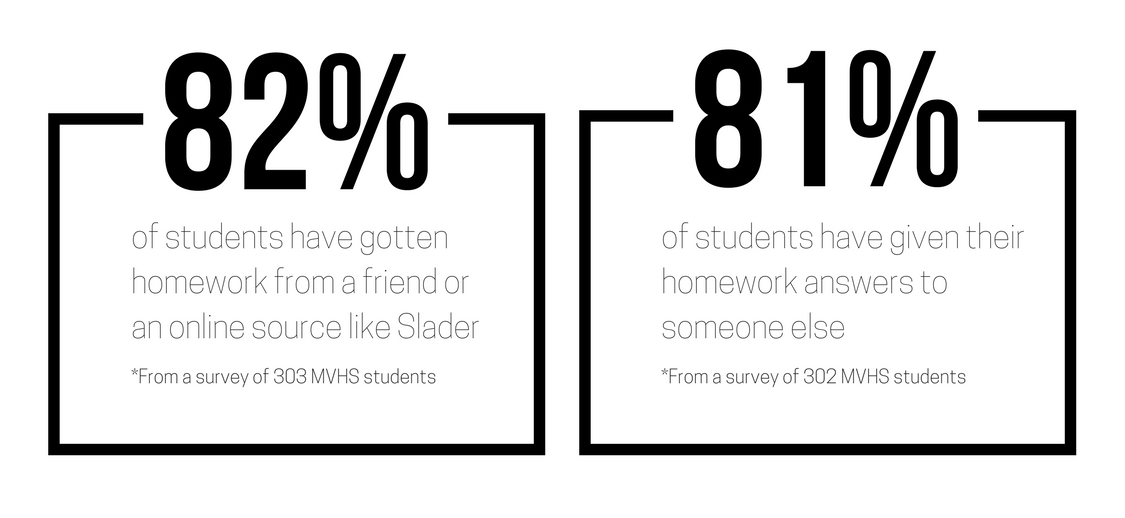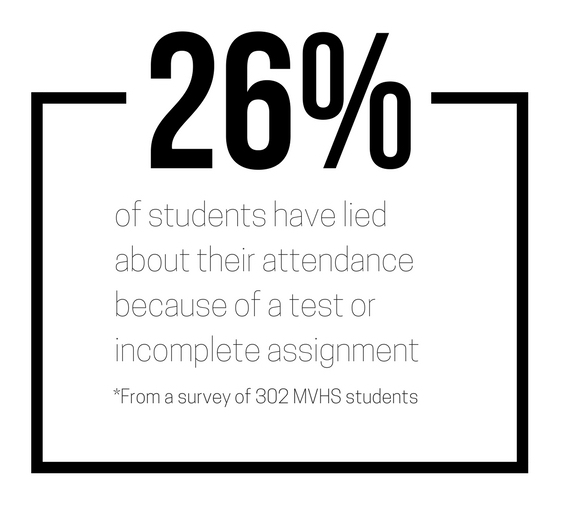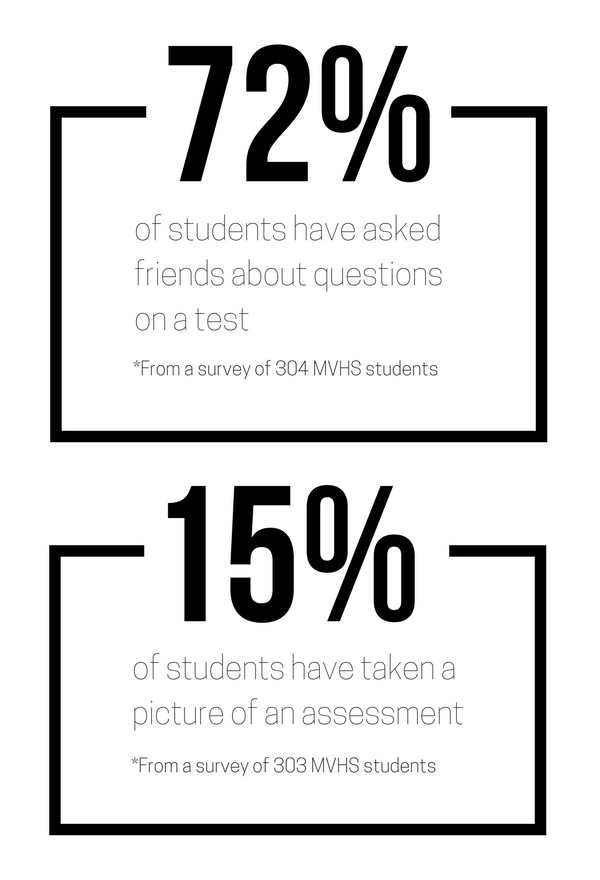Academic dishonesty from students’ perspectives
March 7, 2018
ith the culture at MVHS emphasizing academic success, it is normal for students to take accelerated courses. However, taking this route is not always the smartest decision, as work piles up and students begin to fall under pressure, leading some to cheat their way out.
While the common perception of cheating is something along the lines of looking over at someone else’s paper during the test, the FUHSD academic integrity policy states that academic dishonesty constitutes of “using a person’s work, concepts, designs, data, ideas, research, or documentation, without giving proper credit to the source.” Following that definition, actions like copying homework or allowing others to copy homework is also considered a violation of the academic integrity policy.

Junior Benjamin Bedregal is taking three AP classes — AP chemistry, AP U.S. history and AP calculus AB — as well as Spanish, Law and American Literature. As a student, he has witnessed several accounts of cheating among his peers, but he says that he wouldn’t call the students out for it.
“It’s the choices they make and I’m not going to tell on them […] because I don’t want to be a bad person,” Bedregal said. “But honestly I think that the biggest instances of cheating isn’t homework, it’s missing the test on purpose.”
 Sudden absences on test days at MVHS are not uncommon occurrences. Calling in sick, claiming to have a previous appointment or just ditching class is common for students who feel unprepared for a test. Even though it is not explicitly stated as an academic code violation, Bedregal views missing class on purpose as an instance of cheating.
Sudden absences on test days at MVHS are not uncommon occurrences. Calling in sick, claiming to have a previous appointment or just ditching class is common for students who feel unprepared for a test. Even though it is not explicitly stated as an academic code violation, Bedregal views missing class on purpose as an instance of cheating.
“[I think] purposely missing the test and then asking others what is on the test in order to do better [is cheating],” Bedregal said.
He believes a vital reason why students cheat at MVHS is the mindset that students hold regarding grades and their academic performance rather than the actual learning process. Bedregal believes that students at MVHS hold a steadfast fear of failing, resulting in students making the wrong decisions and taking shortcuts to success.
“It’s kind of sad but they just focus on the tests itself instead of the actual learning so if you cheat off of homework it’s like ‘I’ll just study it later’,” Bedregal said.
Senior Priyanka Sujan has seen students in her classes cheating, a practice that she believes is inherent to MVHS due to the school’s environment.
“The pressure is so high from everyone,” Sujan said. “Like from teachers, they have such high expectations so they expect their kids to get good grades and maintain the level of everybody else and if you’re a bit slower picking things up than others, you might have a hard time.”
Sujan believes that the problem is so persistent at MVHS that even the prevention methods teachers have started using will not decrease the rate of cheating.
“The more regulations that teachers start putting on students, the more kids find a way to cut corner[s],” Sujan said.
She explains that although the conventional view of cheating is looking at someone else’s tests, students have begun using other objects, like Apple watches and graphing calculators as means of communication. She says that since Apple watches aren’t extremely common, teachers tend not to check for them. Graphing calculators, which are necessities for many MVHS math classes, can also be misused as a way to communicate during a test. On one occasion, she noticed two students in her AP statistics class were sharing a calculator on the test.
“During the test [two people in front of me] were passing notes back and forth pretending to use the calculator,” Sujan said. “But really they’d just be putting the answers in the calculator on like a blank program, then giving it to their friend and their friend would do the same thing … and to the teacher, it’d just look like them doing the work for the actual test but that wasn’t the case.”
Yet Sujan believes that people should collaborate while doing homework, and that under certain circumstances, having the same answers shouldn’t be considered a violation of the academic integrity code.
“Doing something by yourself will not necessarily help you grow as a student or a learner versus if you do it like with classmates if it’s homework,” Sujan said. “You should be able to work with others and work with your parents or be able to work with other students and even have the same answers if you guys came up with those answers together because like that’s just you growing and that’s you learning as a student.”
Junior Jeremy Tien says he’s never been too close to an instance of cheating on a test; on occasion, he just notices a teacher pulling aside a student during a test. But even though he rarely sees that type of cheating in action, he believes that the pressure at MVHS correlates with the prevalence of cheating.
“The main reason behind cheating is like because there’s pressure from parents and other students and just themselves — they want to succeed so much,” Tien said.

Tien says that even for people who don’t cheat, the fact that many of their friends have likely cheated before makes cheating seem like a viable option for students. Given the pressure at MVHS, Tien says he understands why students cheat, but that they should be aware of the possible repercussions.
“They should be prepared to face the consequences but I mean I’m not condemning them or anything,” Tien said.
He believes that most people at MVHS don’t make their decision to cheat or not to cheat based off of the academic integrity policy. Rather, he feels that their decisions are more heavily influenced by other factors, like their own moral compass.
“Some people just don’t want to cheat … and other people just don’t care,” Tien said. “They’re like ‘If it gets me the grade I want, then I’ll do it and if I’m able to get away with it then I’ll do it. So it’s not the academic policy that makes a difference — it’s just whatever each individual thinks.”

















